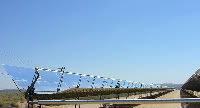Solar Thermal – My Talk with Bruce Allen

I just spoke with my friend Bruce Allen, one of the world’s top experts in solar energy. I thought I’d publish a brief excerpt of the transcript of our conversation, insofar as readers may find it interesting.
Craig: Is it just my imagination, or do I see a great deal of media coverage on the subject of solar thermal? It looks like the world is starting to really latch onto this.
Bruce: You betcha! The message is getting through. I gave a lecture the other day at the Southwestern School of Law in Los Angeles on solar, molten salt, all the stuff in my book — it was really well attended. The problem is that there is going to be a crunch, though.
Craig: Yes, I’m concerned that this won’t happen without top-down leadership, since without it, there is no incentive a business environment that lives on artificially cheap energy.
Bruce: Right. California has mandated that 33% of its energy come from renewables by 2020. That came from (California governor Arnold) Schwarzenegger, but the legislature didn’t pass the measure AB32 that addressed this topic, so it’s an executive order only. If (ex-CEO of EBay) Meg Whitman wins next year, she’s likely to rescind it. She’s a moderately conservative Republican, and she’s all about job creation in the private sector. That means we can’t have restrictive legislation that continues to force jobs out of the state.
She has a very well reasoned platform by the way, focused only on three fundamental: jobs, cost-cutting, and education. She’s a sharp cookie; I had breakfast with her the other day.
Craig: Well, I don’t want to sound holier-than-thou, but if I were a responsible public servant, I’d like to think that I’d be looking a little beyond my state borders. For a governor to say I want jobs, but I don’t care about the environment sounds pretty short-sighted and insular. Of course, I’m sure that there are governors of other states whose positions are totally outrageoups. In West Virginia and Kentucky, it’s coal, baby. We mine it, we burn it, you die from it. We’re old money, old politics, and guess what? We really don’t care.
Bruce: Come on Craig, be realistic. Maybe you have a point about West Virginia, but you can’t expect the state of California to commit economic suicide. The states need to harmonize. Nevada and Arizona need to ensure that their restrictions are in keeping with ours so there isn’t a mass exodus of jobs.
Craig: I guess you’re right. But how likely is that? It brings me back to what you and I both see as a defect in the Constitution: states’ rights. Narrow-minded, get me re-elected politics as usual just creates never-ending corruption. That’s how we wound up with corn ethanol – driven by a few powerful senators from the corn-belt who cared not one whit for the good of anyone outside his state.
And if that weren’t bad enough, it’s too bad about falling prices of fossil fuels; that’s not pushing in a positive direction here, is it? What would you say are the basic pressures?
Bruce: The recession has reduced demand, and technology has increased supply – especially of natural gas. We’ve ramped up enormous new supplies with ultra deep-well drilling into the shale down there — the techniques fracture the shale; there are huge new discoveries. With natural gas at $3 per 1000 cubic feet, it’s really hard to justify renewables on a cost basis.
Here’s something else that will throw a huge curve at all this, though. It’s Israel and Iran. The way I see it, (Israeli Prime Minister Benjamin) Netanyahu told Obama, “you have until December.” You may wake up one day in December to the news that Israel is taking out Iran – or at least part of it. Wait until you see what happens to world oil prices when that happens.
Craig: Yikes. Good speaking with you, Bruce. Please keep me updated, will you?
Bruce: Of course.


[…] purports to answer that question. But I can see from its synopsis that it boils down to this: with natural gas demand factors falling and the supply factors skyrocketing, renewables will not be directly cost-competitive for some time. […]